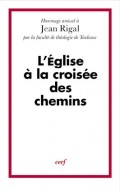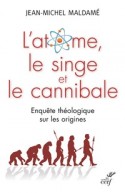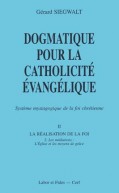Le Péché originel - CF 262
Collection Cogitatio Fidei - N° 262
352 pages - mai 2008
30,00€
Jean-Michel Maldamé relève le défi de reprendre à nouveaux frais la question théologique du péché originel. Dans la théologie et dans la pastorale ou la prédication, mais aussi dans la vie de l'Église et des individus, cette question est tout à la fois centrale, décisive et difficile. Si difficile même qu'on peut être tenté d'en faire l'économie. Il faut savoir gré à l'auteur d'avoir entrepris avec ce livre une clarification salutaire sur cette notion. À cette fin, il fait droit à la Tradition et aux apports contemporains. C'est pour mieux les unir qu'il distingue entre « péché d'Adam », « péché du monde » et « péché originel ». De même qu'il distingue entre « commencement » et « origine » ou encore qu'il insiste sur le primat de l'amour et de la bonté de Dieu ou la grandeur de l'être humain. Au total, cette clarification introduit à une théologie de la rédemption et offre un cadre où se puisse validement approcher le mystère du mal. Selon les mots de l'auteur lui-même, « le fait de ne pas réduire le péché originel à la transmission d'une maladie génétique permet de comprendre que la vie humaine ne peut être compartimentée. La vie qui passe de génération en génération est marquée par le mal et tout enfant en hérite. L'enfant n'est pas coupable de ce qu'il n'a pas commis ; il naît innocent ; il est cependant marqué par l'héritage du péché qui habite l'humanité. Baptisé, il entre dans la communion des saints qui l'enracine dans la vie que Dieu lui offre, la vie trinitaire. Il est important de continuer de nommer cet héritage un "péché", car les notions de blessure ou de penchant mauvais ne suffisent pas à dire la profondeur de ce qui détruit l'humanité : la rupture avec l'amour de Dieu et la perversion de sa vocation à être "à son image et ressemblance" ».
--
Jean-Michel Maldamé takes up a challenge: to provide a new perspective on the theological debate on original sin. This decisive yet problematic issue is central to theology, pastoral life and preaching, as well as in the lives of the Church and individuals. It is so problematic that one might be tempted to avoid it altogether. We must be grateful to the author for casting salutary light on this notion. He does so with all due respect for tradition and contemporary contributions. To combine them more fruitfully, he distinguishes between ‘the sin of Adam’; ‘the sins of the world’ and ‘original sin’. In the same way, he distinguishes between ‘beginning and ‘origin’; and insists on the primacy of love and God’s goodness, or the greatness of the human being. Globally, this elucidation is an introduction to a theology of redemption, offering a framework within which we can legitimately approach the mystery of evil. In the author’s own words, ‘Not reducing original sin to the transmission of some kind of genetic illness allows us to understand that human life cannot be compartmentalized. Life that passes from generation to generation is branded by evil and every child falls heir to it. Children are not guilty of sins they did not commit: they are born innocent, yet marked by the heritage of sin that dwells in all humanity. Baptised, they enter into the communion of saints which roots the child in the life God offers, Trinitarian life. It is important to go on calling that heritage ‘sin’; for words like ‘injury’ or ‘tendencies to wrong’ are not strong enough to describe the profound nature of that which destroys humanity: the rupture with God’s love and the perversion of our vocation to live ‘in His image and likeness’.
--
Jean-Michel Maldamé takes up a challenge: to provide a new perspective on the theological debate on original sin. This decisive yet problematic issue is central to theology, pastoral life and preaching, as well as in the lives of the Church and individuals. It is so problematic that one might be tempted to avoid it altogether. We must be grateful to the author for casting salutary light on this notion. He does so with all due respect for tradition and contemporary contributions. To combine them more fruitfully, he distinguishes between ‘the sin of Adam’; ‘the sins of the world’ and ‘original sin’. In the same way, he distinguishes between ‘beginning and ‘origin’; and insists on the primacy of love and God’s goodness, or the greatness of the human being. Globally, this elucidation is an introduction to a theology of redemption, offering a framework within which we can legitimately approach the mystery of evil. In the author’s own words, ‘Not reducing original sin to the transmission of some kind of genetic illness allows us to understand that human life cannot be compartmentalized. Life that passes from generation to generation is branded by evil and every child falls heir to it. Children are not guilty of sins they did not commit: they are born innocent, yet marked by the heritage of sin that dwells in all humanity. Baptised, they enter into the communion of saints which roots the child in the life God offers, Trinitarian life. It is important to go on calling that heritage ‘sin’; for words like ‘injury’ or ‘tendencies to wrong’ are not strong enough to describe the profound nature of that which destroys humanity: the rupture with God’s love and the perversion of our vocation to live ‘in His image and likeness’.
- Dimensions : 135x215x25
- ISBN : 9782204085731
- Poids : 450 grammes
DU MÊME AUTEUR
L'Église à la croisée des chemins
248 pages - nov. 2002
> VOIR TOUS LES LIVRES DE l'AUTEUR
DANS LA CATÉGORIE
Dogmatique II-2 : Les médiations : L'Église et les moyens de grâce
de Gérard Siegwalt
402 pages - janv. 1993











